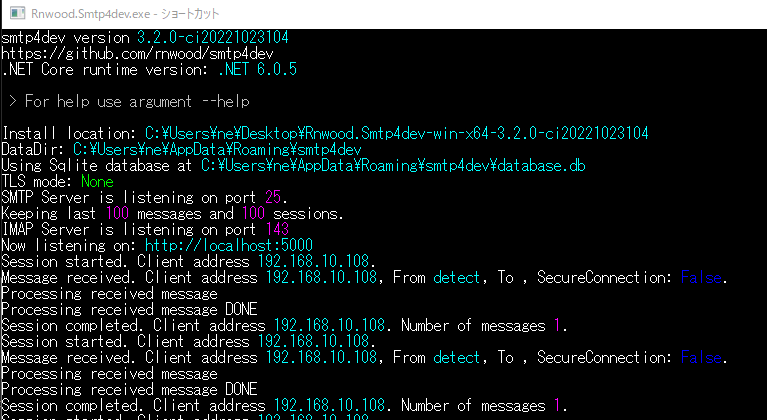PSoC 62S2 Wi-Fi BTパイオニアキットでのSMTPのメールクライアントを作成し、テスト用のSMTPサーバ「Smtp4dev」で動作確認します。。
テスト用のSMTPサーバ「Smtp4dev」のインストール
メール送信のテストのためにダミーのSMTPサーバ「Smtp4dev」を使用するため、「rnwood/smtp4dev」からWindows x64 binary standalone – Server edition「Rnwood.Smtp4dev-win-x64-3.2.0-ci20221023104.zip」をダウンロードします。
メールクライアントの作成
メールクライアント「Mail_Test」を作成します。「PSoC 62S2 Wi-Fi BTパイオニアキットを使ったTCP Client」で作成したTCP Clientをベースにして、メールクライアントの機能を追加します。
SMTP(Simple Mail Transfer Protocol)はメール送信に用いられるプロトコルで、TCPポートの 25番を用います。
- 128行目のcy_rslt_t tcp_client_recv_handler()で、テスト用のSMTPサーバ「Smtp4dev」からのデータを受信します。
- 155行目で受信データを表示します。TCP Clientを流用したために、このようなif文を使っています。
- 158行目でmail_send()を呼び出し、SMTPに従ってデータをテスト用のSMTPサーバ「Smtp4dev」に送信します。
- 11行目のcase文で、「HELO」を出力します。
- 26行目のcase文で、「MAIL FROM」を出力します。
- 42行目のcase文で、「RCPT TO」を出力します。
- 58行目のcase文で、「DATA」を出力します。
- 71行目のcase文で、メールヘッダと本文を出力し、メールの終了「.」を出力します。
- 103行目のcase文で、「QUIT」を出力して、SMTPを終了します。
source\tcp_client.c
・・・・
void mail_send(cy_socket_t mail_handle, int num) { // tomosoft
cy_rslt_t result;
char buf[MAX_TCP_DATA_PACKET_LENGTH];
//uint32_t bytes_received = 0;
uint32_t bytes_sent = 0;
switch (num) {
case 0:
memset(buf, 0, sizeof(buf));
/* HELOの送信 */
strcpy(buf, "HELO ");
strcat(buf, "smtp4dev");
strcat(buf, "\n");
printf("send: %s", buf);
result = cy_socket_send(mail_handle, buf, strlen(buf),
CY_SOCKET_FLAGS_NONE, &bytes_sent);
if (result == CY_RSLT_SUCCESS) {
//printf("Acknowledgment sent to TCP server\n");
}
break;
case 1:
memset(buf, 0, sizeof(buf));
/* MAIL FROMの送信 */
strcpy(buf, "MAIL FROM: ");
strcat(buf, "<from@example.com>");
strcat(buf, "\r\n");
printf("send: %s", buf);
result = cy_socket_send(mail_handle, buf, strlen(buf),
CY_SOCKET_FLAGS_NONE, &bytes_sent);
if (result == CY_RSLT_SUCCESS) {
//printf("Acknowledgment sent to TCP server\n");
}
break;
case 2:
memset(buf, 0, sizeof(buf));
/* RCPT TOの送信 */
strcpy(buf, "RCPT TO: ");
strcat(buf, "<to@smtp4dev>");
strcat(buf, "\r\n");
printf("send: %s", buf);
result = cy_socket_send(mail_handle, buf, strlen(buf),
CY_SOCKET_FLAGS_NONE, &bytes_sent);
if (result == CY_RSLT_SUCCESS) {
//printf("Acknowledgment sent to TCP server\n");
}
break;
case 3:
memset(buf, 0, sizeof(buf));
strcpy(buf, "DATA\r\n");
printf("send: %s", buf);
result = cy_socket_send(mail_handle, buf, strlen(buf),
CY_SOCKET_FLAGS_NONE, &bytes_sent);
if (result == CY_RSLT_SUCCESS) {
//printf("Acknowledgment sent to TCP server\n");
}
break;
case 4:
memset(buf, 0, sizeof(buf));
strcpy(buf, "From:from@example.com");
strcat(buf, "\r\n");
strcat(buf, "To:to@smtp4dev");
strcat(buf, "\r\n");
strcat(buf, "Subject: テストメール");
strcat(buf, "\r\n");
strcat(buf, "\n");
strcat(buf, "これはテストメールです");
strcat(buf, "\r\n");
printf("send: %s", buf);
result = cy_socket_send(mail_handle, buf, strlen(buf),
CY_SOCKET_FLAGS_NONE, &bytes_sent);
if (result == CY_RSLT_SUCCESS) {
//printf("Acknowledgment sent to TCP server\n");
}
memset(buf, 0, sizeof(buf));
strcpy(buf, ".\r\n");
result = cy_socket_send(mail_handle, buf, strlen(buf),
CY_SOCKET_FLAGS_NONE, &bytes_sent);
if (result == CY_RSLT_SUCCESS) {
//printf("Acknowledgment sent to TCP server\n");
}
printf("send: %s", buf);
break;
case 5:
result = cy_socket_send(mail_handle, "QUIT\r\n", strlen("QUIT\r\n"),
CY_SOCKET_FLAGS_NONE, &bytes_sent);
if (result == CY_RSLT_SUCCESS) {
//printf("Acknowledgment sent to TCP server\n");
}
printf("send: QUIT\r\n");
break;
}
}
/*******************************************************************************
* Function Name: tcp_client_recv_handler
*******************************************************************************
* Summary:
* Callback function to handle incoming TCP server messages.
*
* Parameters:
* cy_socket_t socket_handle: Connection handle for the TCP client socket
* void *args : Parameter passed on to the function (unused)
*
* Return:
* cy_result result: Result of the operation
*
*******************************************************************************/
cy_rslt_t tcp_client_recv_handler(cy_socket_t socket_handle, void *arg) {
/* Variable to store number of bytes send to the TCP server. */
//uint32_t bytes_sent = 0;
/* Variable to store number of bytes received. */
uint32_t bytes_received = 0;
char message_buffer[MAX_TCP_DATA_PACKET_LENGTH];
cy_rslt_t result;
// printf("============================================================\n");
memset(message_buffer, 0, sizeof(message_buffer));
result = cy_socket_recv(socket_handle, message_buffer, TCP_LED_CMD_LEN,
CY_SOCKET_FLAGS_NONE, &bytes_received);
if (message_buffer[0] == LED_ON_CMD) {
/* Turn the LED ON. */
cyhal_gpio_write(CYBSP_USER_LED, CYBSP_LED_STATE_ON);
printf("LED turned ON\n");
sprintf(message_buffer, ACK_LED_ON);
} else if (message_buffer[0] == LED_OFF_CMD) {
/* Turn the LED OFF. */
cyhal_gpio_write(CYBSP_USER_LED, CYBSP_LED_STATE_OFF);
printf("LED turned OFF\n");
sprintf(message_buffer, ACK_LED_OFF);
} else {
printf("rcv %s", message_buffer);
sprintf(message_buffer, MSG_INVALID_CMD);
}
mail_send(socket_handle, recv_count);
recv_count++;
if (recv_count >= 6) {
recv_count = 0;
}
/* Send acknowledgment to the TCP server in receipt of the message received.
result = cy_socket_send(socket_handle, message_buffer,
strlen(message_buffer), CY_SOCKET_FLAGS_NONE, &bytes_sent);
if (result == CY_RSLT_SUCCESS) {
printf("Acknowledgment sent to TCP server\n");
}
*/
return result;
}
・・・・
メールクライアントの実行
作成したメールクライアント「Mail_Test」を実行し、メールサーバ「Smtp4dev」を使用してメールを送信します。
- インストールしたメールサーバ「Smtp4dev」の「・・・Rnwood.Smtp4dev-win-x64-3.2.0-ci20221023104\Rnwood.Smtp4dev.exe」を実行します。
- TeraTermを起動すると、TeraTermには次のようにSMTPプロトコルの実行ログが表示されます。
- メールサーバ「Smtp4dev」のログが「http://localhost:5000」に表示されます。「Messages」タブには次のように表示されます。
- メールサーバ「Smtp4dev」のログが「http://localhost:5000」に表示されます。「Sessions」タブには次のように表示されます。





